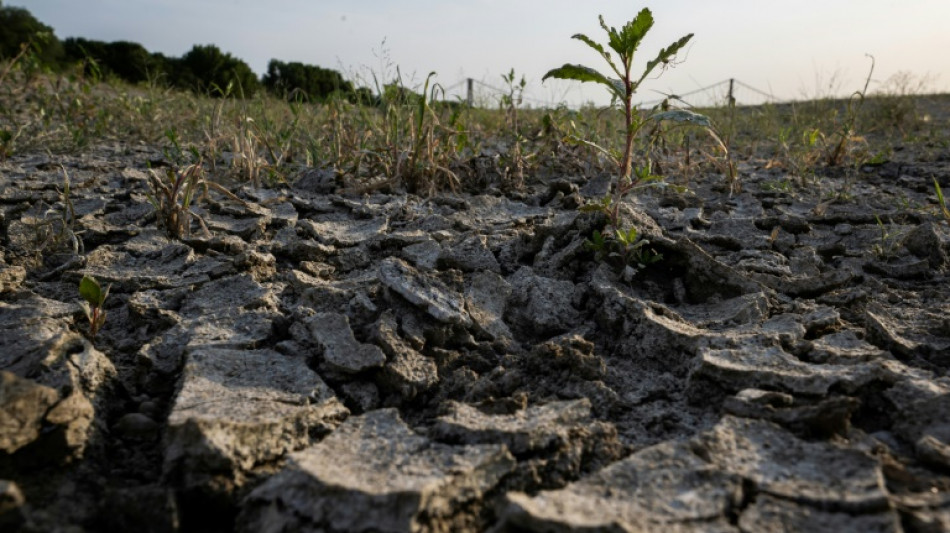
-
 Postecoglou says Spurs 'need to reinforce' in transfer window
Postecoglou says Spurs 'need to reinforce' in transfer window
-
Le Pen says days of new French govt numbered

-
 Global stocks mostly rise after US tech rally
Global stocks mostly rise after US tech rally
-
Villa boss Emery set for 'very difficult' clash with Newcastle

-
 Investors swoop in to save German flying taxi startup
Investors swoop in to save German flying taxi startup
-
How Finnish youth learn to spot disinformation

-
 South Korean opposition postpones decision to impeach acting president
South Korean opposition postpones decision to impeach acting president
-
12 killed in blast at Turkey explosives plant

-
 Panama leaders past and present reject Trump's threat of Canal takeover
Panama leaders past and present reject Trump's threat of Canal takeover
-
Hong Kong police issue fresh bounties for activists overseas

-
 Saving the mysterious African manatee at Cameroon hotspot
Saving the mysterious African manatee at Cameroon hotspot
-
India consider second spinner for Boxing Day Test

-
 London wall illuminates Covid's enduring pain at Christmas
London wall illuminates Covid's enduring pain at Christmas
-
Poyet appointed manager at South Korea's Jeonbuk

-
 South Korea's opposition vows to impeach acting president
South Korea's opposition vows to impeach acting president
-
The tsunami detection buoys safeguarding lives in Thailand

-
 Teen Konstas to open for Australia in Boxing Day India Test
Teen Konstas to open for Australia in Boxing Day India Test
-
Asian stocks mostly up after US tech rally

-
 US panel could not reach consensus on US-Japan steel deal: Nippon
US panel could not reach consensus on US-Japan steel deal: Nippon
-
The real-life violence that inspired South Korea's 'Squid Game'

-
 Blogs to Bluesky: social media shifts responses after 2004 tsunami
Blogs to Bluesky: social media shifts responses after 2004 tsunami
-
Tennis power couple de Minaur and Boulter get engaged

-
 Supermaxi yachts eye record in gruelling Sydney-Hobart race
Supermaxi yachts eye record in gruelling Sydney-Hobart race
-
Hawaii's Kilauea volcano erupts, spewing columns of lava

-
 Sokoman Minerals Completes Phase 1 Diamond Drilling Program Fleur de Lys Gold Project, NW Newfoundland
Sokoman Minerals Completes Phase 1 Diamond Drilling Program Fleur de Lys Gold Project, NW Newfoundland
-
Canadian Government Provides C$100 Million Financing LOI to Green Technology Metals in Support of Electric Royalties' Flagship Lithium Royalty Asset in Ontario

-
 Sendero Resources Announces First Tranche Closing of Its Non-Brokered Private Placement
Sendero Resources Announces First Tranche Closing of Its Non-Brokered Private Placement
-
EVSX Completes Installation of Multi Chemistry Line

-
 InterContinental Hotels Group PLC Announces Transaction in Own Shares - December 24
InterContinental Hotels Group PLC Announces Transaction in Own Shares - December 24
-
El Salvador Congress votes to end ban on metal mining

-
 Five things to know about Panama Canal, in Trump's sights
Five things to know about Panama Canal, in Trump's sights
-
NBA fines Minnesota guard Edwards $75,000 for outburst

-
 Haitians massacred for practicing voodoo were abducted, hacked to death: UN
Haitians massacred for practicing voodoo were abducted, hacked to death: UN
-
Inter beat Como to keep in touch with leaders Atalanta

-
 Mixed day for global stocks as market hopes for 'Santa Claus rally'
Mixed day for global stocks as market hopes for 'Santa Claus rally'
-
Man Utd boss Amorim questions 'choices' of Rashford's entourage

-
 Trump's TikTok love raises stakes in battle over app's fate
Trump's TikTok love raises stakes in battle over app's fate
-
Is he serious? Trump stirs unease with Panama, Greenland ploys

-
 England captain Stokes to miss three months with torn hamstring
England captain Stokes to miss three months with torn hamstring
-
Support grows for Blake Lively over smear campaign claim

-
 Canada records 50,000 opioid overdose deaths since 2016
Canada records 50,000 opioid overdose deaths since 2016
-
Jordanian, Qatari envoys hold talks with Syria's new leader

-
 France's second woman premier makes surprise frontline return
France's second woman premier makes surprise frontline return
-
France's Macron announces fourth government of the year

-
 Netanyahu tells Israel parliament 'some progress' on Gaza hostage deal
Netanyahu tells Israel parliament 'some progress' on Gaza hostage deal
-
Guatemalan authorities recover minors taken by sect members

-
 Germany's far-right AfD holds march after Christmas market attack
Germany's far-right AfD holds march after Christmas market attack
-
European, US markets wobble awaiting Santa rally

-
 Serie A basement club Monza fire coach Nesta
Serie A basement club Monza fire coach Nesta
-
Mozambique top court confirms ruling party disputed win


Climate change's fingerprints on ever hotter heatwaves
Hotter, longer, more frequent. Heatwaves such as the one currently roasting much of Europe, or the record-shattering hot spell endured by India and Pakistan in March, are an unmistakable sign of climate change, experts said Monday.
- Humans to blame -
"Every heatwave that we are experiencing today has been made hotter and more frequent because of human induced climate change," said Friederike Otto, senior lecturer at Imperial College London's Grantham Institute for Climate Change.
"It's pure physics, we know how greenhouse gas molecules behave, we know there are more in the atmosphere, the atmosphere is getting warmer and that means we are expecting to see more frequent heatwaves and hotter heatwaves."
In recent years, advances in the discipline known as attribution science have allowed climatologists to calculate how much global heating contributes to individual extreme weather events.
The India-Pakistan heatwave, for example, was calculated to have been 30 times more likely with the more than 1.1 degrees Celsius of warming that human activity has caused since the mid-nineteenth century.
The heatwave that shattered records in North America in June 2021, leaving hundreds dead as temperatures soared to 50C in places, would have been virtually impossible without global heating.
And the last major European heatwave, in 2019, was made 3C hotter by climate change.
"The increase in the frequency, duration, and intensity of these events over recent decades is clearly linked to the observed warming of the planet and can be attributed to human activity," the World Meteorological Organisation said in a Monday statement.
- Worse to come -
However unbearable temperatures get this week, scientists are unanimous: there is worse to come.
At 1.5C of warming -- the most ambitious Paris climate agreement goal -- UN climate scientists calculate that heatwaves will be more than four times more likely than the pre-industrial baseline.
At 2C or warming, that figure reaches 5.6 times more likely, and at 4C heatwaves will be nearly 10 times more likely to occur.
Despite three decades of UN-led negotiations, countries' climate plans currently put Earth on course to warm a "catastrophic" 2.7C, according to the UN.
Matthieu Sorel, a climatologist at Meteo-France, said that climate change was already influencing the frequency and severity of heatwaves.
"We're on the way to hotter and hotter summers, where 35C becomes the norm and 40C will be reached regularly," he said.
- Danger of death -
The heatwaves of the future depend largely on how rapidly the global economy can decarbonise.
The UN's climate science panel has calculated that 14 percent of humanity will be hit with dangerous heat every five years on average with 1.5C of warming, compared with 37 percent at 2C.
"In all of places in the world where we have data there is an increase in mortality risk when we are exposed to high temperatures," said Eunice Lo, a climate scientist at the University of Bristol's Cabot Institute for the Environment.
It's not only the most vulnerable people who are at risk of health impacts frim heat, it's even the fit and healthy people who will be at risk."
There is a real risk in future of so-called "wet bulb" temperatures -- where heat combines with humidity to create conditions where the human body cannot cool itself via perspiration -- breaching lethal levels in many parts of the world.
As well as the imminent threat to human health, heatwaves compound drought and make larger areas vulnerable to wild fires, such as those now raging across parts of France, Portugal, Spain, Greece and Morocco.
They also menace the food supply.
India, the world's second-largest wheat producer, chose to ban grain exports after the heatwave impacted harvests, worsening a shortage in some countries prompted by Russia's invasion of key exporter Ukraine.
T.Ward--AMWN

